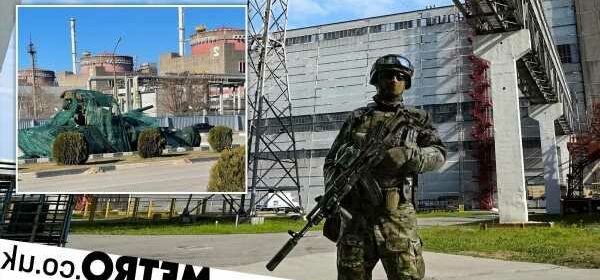Europe’s largest nuclear power plant is 'completely out of control'

Europe’s largest nuclear power plant in Ukraine ‘is completely out of control’ and must be stabilised to avoid a disaster, the UN’s nuclear chief has warned.
Rafael Grossi issued an urgent plea to Russia and Ukraine to allow experts to visit the Zaporizhzhia plant in the south-eastern city of Enerhodar, seized by Vladimir Putin’s troops in March.
‘Every principle of nuclear safety has been violated there,’ said the director general of the International Atomic Energy Agency (IAEA).
‘What is at stake is extremely grave and dangerous and getting more perilous every day.’
The plant is controlled by Russia, but Ukrainian staff continue to run its nuclear operations, leading to friction and alleged violence, Mr Grossi said.
Zaporizhzhia’s capture initially sparked fears of an emergency like 1986’s Chernobyl meltdown.
Russian forces occupied the heavily contaminated site north of Kyiv soon after the invasion but handed control back to Ukraine at the end of March.
The supply chain of equipment and spare parts has been interrupted and the IAEA ‘needs to perform very important inspections to ensure that nuclear material is being safeguarded’.
Speaking in New York, the IAEA chief said his team need protection to get to the plant, adding: ‘I’m pleading to both sides to let this mission proceed.’
It comes as powerful explosions rock areas close to the plant.
Kremlin forces have reportedly fired 60 rockets at Nikopol, which is across the Dnieper river, with 50 buildings damaged.
Power lines were hit, leaving people without electricity, according to Ukrainian authorities.
US Secretary of State Antony Blinken on Monday blasted Russia’s actions as ‘the height of irresponsibility’, accusing Moscow of using it as a ‘nuclear shield’ in attacks on Ukrainian forces.
At least four civilians have been killed and 10 wounded after nine Ukrainian regions in total have come under fire in the past day.
Meanwhile, the first shipment of Ukrainian grain to the UK since the war began is expected to arrive in 10 days.
Millions of tonnes of grain have been trapped in the war-torn country, but there are hopes a UN-brokered agreement has changed this.
Get in touch with our news team by emailing us at [email protected].
For more stories like this, check our news page.
Source: Read Full Article

